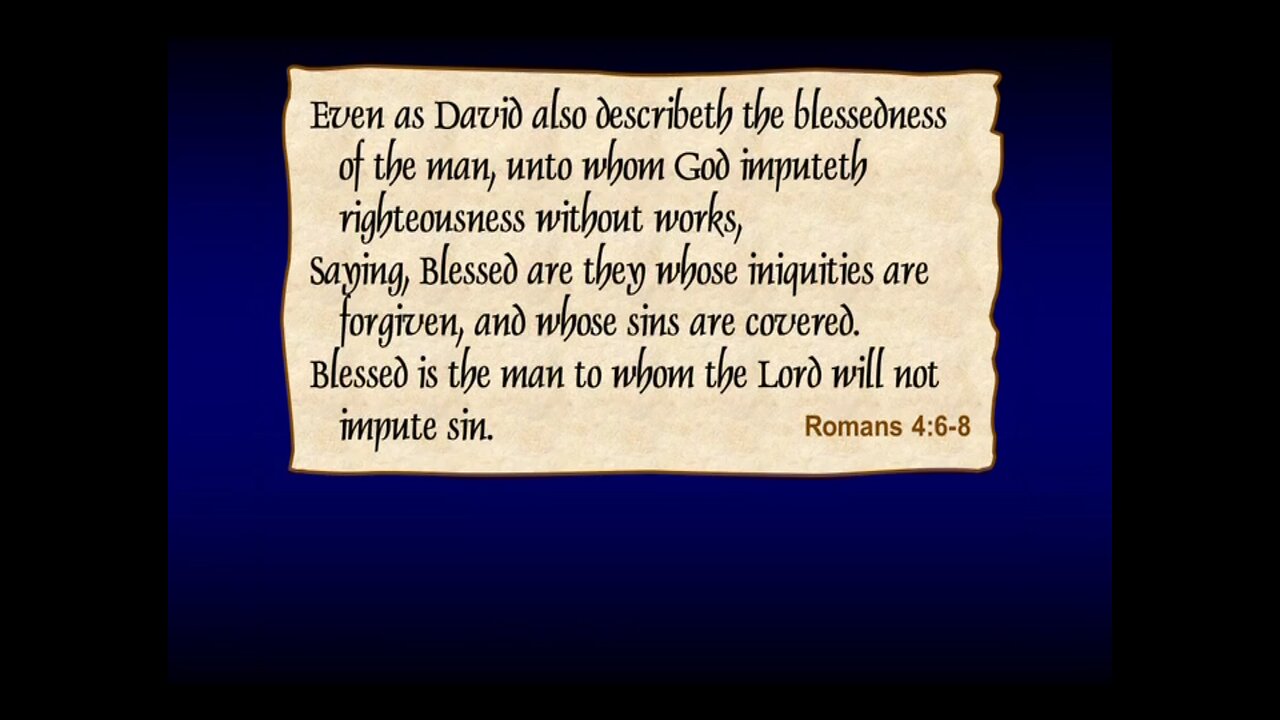Premium Only Content

Romans by Chuck Missler Lesson 5
The Book of Romans Session 5
Romans Chapter 4:
God’s Greatest Gift
Review
Chapters 1 and 2 dealt with reality that we are all part of a fallen race:
- Pagan Man - The creation is enough
Guilty!
- Moral Man - Doesn’t live up to own conscience
Guilty!
- Religious Man - Commitment and sincerity
Guilty!
Chapter 3 dealt with God’s Greatest Problem: to compromise His hatred of
sin would be to compromise His own character. How can a just God justify
sinful man? How can He permit man to enjoy the destiny God made for us?
In Chapter 4, Abraham and David speak to Israel about God’s Great-
est Gift. This chapter will demonstrate the unity of the Old and New
Testament together.
• How was Abraham saved (Before the Law)?
• How wad David saved (Under the Law)?
Preview
•Abraham and David were held in higher esteem by the nation Is-
rael than any other two whose lives are recorded in the Old Testa-
ment. Abraham was the founder of the Hebrew race, and David
was their greatest king.
•Basis for their justification: Abraham (before the Law) Rom 4:1-5
and David (under the law) Rom 4:6-8.
Verse 1]
What shall we say then that Abraham our father, as pertaining to the flesh, hath found?
He refers to Abraham as our forefather. (propa,tora “forefather,” is used
only here in the NT.) Undoubtedly this was to distinguish Abraham’s
physical ancestry from his spiritual fatherhood, mentioned later in Rom
4:11-12, 16.
“Pertaining to the flesh” is modifying verb, not the noun: should be
“What then shall we say then that Abraham hath found according to
the flesh.”
Cloudy Ethics
Abraham receives a lesson in ethics from Pharaoh (Cf. Gen 12:10-20.).
Yet he later pulls the same stunt in Gen 20 with Abimelech, King of
Gerar. (Subsequent silence from heaven for 13 years...)
Verse 2]
For if Abraham were justified by works, he hath whereof to glory; but not before God.
What kind of people were reading this? A mix of ordinary believers,
amidst lots of confusion: Cf. Acts 15:1ff. [Works or faith? (legalism =
works + faith).]
The Jews were proud of Abraham and themselves. The Rabbis had taught
that Abraham had a surplus of merit from his works that was available
to his descendants. Paul built on that idea and agreed that, assuming
that Abraham was justified by works, he had something to boast about
(cf. boasting or bragging in Rom 2:17, 23; 3:27). But, Paul insisted,
his boasting could only be before other people, not before God.
How Was Abraham Saved?
Verse 3]
For what saith the scripture? Abraham believed God, and it was counted unto
him for righteousness.
Gen 15:6: Abraham was reckoned to righteousness by his faith when
he was still on Gentile ground, two chapters before the covenant sign
of circumcision was placed upon his flesh.
Steps of faith of an uncircumcised Abraham (from his “call,” Gen 12,
to his circumcision, Gen 17): At the time Abraham was “saved” he
wasn’t “Jewish”!
Abraham’s Steps of Faith
Steps of faith of an uncircumcised Abraham: from his “call” in Gen 12
to his circumcision in Gen 17.
1) Revelation of the God of glory in Ur of Chaldees;
2) Obedience to God’s command to leave his country, kindred,
father’s house; [tarrying at Haran until his father died (Acts 7:4; Gen 11:3)];
3) Altar worship in Canaan (Gen 12:7, 8);
4) Choosing his portion with God [vs. Lot’s separation (Gen 13)];
5) Victory over the kings (Gen 14);
6) Received by Melchizedek, “God Most High” and rejecting
riches from men (Gen 14);
7) Believing God’s word concerning his seed, counting on God
to do the impossible, and thus “accounted righteous” (Gen 15
The Council at Jerusalem: Acts 15
There was a major dispute over Gentile salvation: Paul, Barnabas, &
Peter defend their case before the elders; James presides. There are two
issues: How can a Gentile be saved? and What’s to become of Israel?
Two Dilemmas
1)Do Christians have to come under the law to be saved?
2)If not, then what happens to Israel?
And after they had held their peace, James answered, saying, Men and
brethren, hearken unto me: Simeon hath declared how God at the first did
visit the Gentiles, to take out of them a people for his name. And to this
agree the words of the prophets; as it is written, After this I will return,
and will build again the tabernacle of David, which is fallen down; and I
will build again the ruins thereof, and I will set it up: That the residue of
men might seek after the Lord, and all the Gentiles, upon whom my name
is called, saith the Lord, who doeth all these things.
Acts 15:13-17
The quote James uses deals with this second question (Acts 15:13-17;
q.v. Amos 9:11,12). God is not through with Israel (Rom 9, 10, 11).
Justification by “Works”
Verse 4]
Now to him that worketh is the reward not reckoned of grace, but of debt.
• If you are working, what you get for that is wages: if you are doing
something for me, then I owe you a debt
•If I give you something you don’t deserve = “Grace.” Your “trying
to deserve it” clouds the graciousness of my gift!
Verse 5]
But to him that worketh not, but believeth on him that justifieth the ungodly,
his faith is counted for righteousness.
“...to the one who does not work, but believes...” (nasb. Present tense:
continuous action: “Who keeps on not working...”). “...counted” =
logi,zoma logizomai: an accounting term.
Can the Bible contradict itself? Interpret the obscure passages by the
clear passages...
If the plain sense makes common sense, seek no other sense.
Martin Luther
Paul vs. James? Do They Contradict Each Other?
"What doth it profit, my brethren, though a man say he hath faith, and
have not works? can faith save him? If a brother or sister be naked, and
destitute of daily food, And one of you say unto them, Depart in peace,
be ye warmed and filled; notwithstanding ye give them not those things
which are needful to the body; what doth it profit? Even so faith, if it hath
not works, is dead, being alone. Yea, a man may say, Thou hast faith, and
I have works: shew me thy faith without thy works, and I will shew thee
my faith by my works. Thou believest that there is one God; thou doest
well: the devils also believe, and tremble. But wilt thou know, O vain man,
that faith without works is dead? Was not Abraham our father justified by
works, when he had offered Isaac his son upon the altar? Seest thou how
faith wrought with his works, and by works was faith made perfect?"
James 2:14-22
Abraham was justified in Genesis 15 and “tested” in Genesis 22.
And the scripture was fulfilled which saith, Abraham believed God, and
it was imputed unto him for righteousness: and he was called the Friend
of God. Ye see then how that by works a man is justified, and not by faith
only. Likewise also was not Rahab the harlot justified by works, when she
had received the messengers, and had sent them out another way? For as
the body without the spirit is dead, so faith without works is dead also.
James 2:23-26
•True faith produces works (as a testimony); true works don’t produce
faith (just bragimonies)
•Many preach “Guilt, fear, obligation” = a big bonfire (1 Cor 3:12-15).
•Only by faith is the Holy Spirit released to work through the believer
for enduring results.
How Was David Saved?
Abraham lived before the law...How was David saved? David lived
under the law and understood : Israel’s greatest king was also justified
by faith alone.
Verse 6]
Even as David also describeth the blessedness of the man, unto whom God
imputeth righteousness without works,
Verse 7]
Saying, Blessed are they whose iniquities are forgiven, and whose sins are
covered
Verse 8]
Blessed is the man to whom the Lord will not impute sin.
Paul quotes Ps 32:1, 2: “ Blessed is he whose transgression is forgiven,
whose sin is covered. Blessed is the man unto whom the LORD imputeth
not iniquity, and in whose spirit there is no guile.” [Augustine of Hippo
had these words painted on a placard and placed at the foot of his bed
where his dying eyes could rest upon them.] This teaches justification
apart from human merit (“not impute” = “not take into account” (Ps
51:9; Isa 43:24, 25). Martin Luther loved best the Psalmi Paulini, “The
Pauline Psalms:” Psalms 32, 51, 130 and 143.
Vocabulary
•Transgression - “Crossing over the line”
•Sin - “To miss the mark”
•Iniquity - “Twisted”
•Guile - “Deception”
•Forgive - “To remove a burden”
•Impute - “To put on account”
Transgression is a form of rebellion against God. Sin means to not live
up to God’s standards. Iniquity describes what happens to the inner
character of the sinner. Forgiveness is pictured by the Scapegoat on
Yom Kippur (Lev 16:20-22; Ps 103:12; Jn 1:29). Impute is a book-
keeping term. When we confess our sins, God cancels our debt; no
longer on the books.
Verrse 9]
Cometh this blessedness then upon the circumcision only, or upon the uncircumcision also? for we say that faith was reckoned to Abraham for righteousness.
Verse 10]
How was it then reckoned? when he was in circumcision, or in uncircumcision?
Not in circumcision, but in uncircumcision.
Verse 11]
And he received the sign of circumcision, a seal of the righteousness of the
faith which he had yet being uncircumcised: that he might be the father of all
them that believe, though they be not circumcised; that righteousness might be imputed unto them also:
Salvation Not by Rituals
We call Abraham our “father,” not because we “become Jewish” by
coming to Christ. He is the Father of the faithful because he had faith
prior to being circumcised. Abraham was justified as a Gentile before
he was circumcised; his age when he was declared righteous is not
stated (Gen 15:6), but when Hagar bore him Ishmael, he was 86 (Gen
16:16). After that, God instructed Abraham to circumcise all his male
descendants as a sign of God’s covenant with him...This was done when
Abraham was 99 (Gen 17:24 ).
Therefore the circumcision of Abraham followed his justification by
faith by more than 13 years.
Verse 12]
And the father of circumcision to them who are not of the circumcision only,
but who also walk in the steps of that faith of our father Abraham, which he
had being yet uncircumcised.
Thus, Abraham is our father, too. He is the Father of the Faithful: of
those who follow in the steps of faith. Paul has turned the Jew’s boast
upside down: it is not the Gentile who must come to the Jew’s circum-
cision for salvation; it is the Jew who must come to a “Gentile” faith:
Abraham had faith long before he was circumcised…
Rituals are not the means; only a testimony. Baptism, too, is only a
testimony. Sacraments and ceremonies of the church, while useful when
viewed in proper light, become ruinous when perverted into grounds
for confidence.
Promises Given on Faith Alone
Verse 13]
For the promise, that he should be the heir of the world, was not to Abraham,
or to his seed, through the law, but through the righteousness of faith.
What does being “heir of the world” mean?
•God’s promise (Gen 12:1-3 ) preceded the giving of the Law by
four centuries (Gal 3:17).
•Believers of all ages are “Abraham’s seed,” for they enjoy the same
spiritual blessing (justification) which he enjoyed (Gal 3:29).
Don’t Neglect God’s Plan
Verse 14]
For if they which are of the law be heirs, faith is made void, and the promise
made of none effect [nullified]:
•If Jews could become heirs by obeying the Law, then faith has no
value: “void”; the noun keno,j kenos, “empty, without content,”
(1Cor 15:10, 58). Also, the promise is worthless: “has been made
invalid.”
•Why? God hates your trust in “good works” because you neglect
all that God is, all that He has done, and desires for you...
1)What it cost God to give Christ; the Father’s forbearance as His
Son suffered…
2)What it cost Christ to put away sin at the cross; “God’s Riches At
Christ’s Expense.”
3)What honor God has given Him “because of the suffering of
death”;
4)What plans for the future God has arranged through Christ’s having
made peace by His blood on the cross, to reconcile “things upon
the earth and things in heaven, unto Himself.” We need to come to
Him on His terms, not ours!
Verse 15]
Because the law worketh wrath: for where no law is, there is no transgression
[violation].
(Lit., “the Law keeps on producing wrath”) as a consequence of dis-
obedience. No one can keep the Law fully; therefore God, in wrath
against sin, judges those who disobey.
The law can only curse. It cannot bless. It intensified sin by giving it
the specific character of transgression, an overstepping of a prohibition
(cf. Rom. 5:13), making it the wilful violation of known law.
Why is this so important to us? If we come to God on the basis of the
law, the only result can be wrath. Then we must be perfect on the basis
of our own merit. It’s the same principle–the same basis–that is the
same trap for us. We, too, fall into the trap of attempting to rely on our
own merit, rather than His.
The law cannot be the means of earning what was freely given.
Of Grace By Faith
Verse 16]
Therefore it is of faith, that it might be by grace; to the end the promise might
be sure to all the seed; not to that only which is of the law, but to that also whichis of the faith of Abraham; who is the father of us all,
The minute that you are not bold in your faith, you are under the law.
“You don’t deserve it?” And you never will!
The human exercise of faith is simply the prerequisite response of trust
in God and His promise. Since faith and grace go together, and since
the promise is by grace, the promise can be received only by faith, not
by the Law.
Verse 17]
(As it is written, I have made thee a father of many nations,) before him whom
he believed, even God, who quickeneth the dead, and calleth those things which be not as though they were.
Greek: literally, “God making alive dead ones, and calling things not
being, being.” Cf. Gen 1:3, “Let light be.” And light was.
Paul then supported his conclusion in verse 16 with scriptural authority,
quoting God’s covenantal promise from Genesis 17:5.
Another reason the promise is by faith is so that it may be guaranteed
to all Abraham’s offspring, not only the Jews (those of the Law) but to
all who exercise faith in God. If the promise were fulfilled for those
who keep the Law, then no Gentiles (or Jews either) could be saved!
But this cannot be, because “Abraham is the father of us all, that is, all
who believe” (cf. “our” in v. 1; also cf. Gal. 3:29). Yet, Israel is also
one of those nations.
Israel and Church Distinct
Don’t make an eschatological mistake: Abraham is the father of all
the faithful—but that is not a basis to equate the Church with Israel.
The fact that believers in this Church Age are identified with Abraham
and God’s covenant with him does not mean that the physical and
temporal promises to Abraham and his physical descendants are either
spiritualized or abrogated. It simply means that God’s covenant, and
Abraham’s response of faith to it, have spiritual dimensions as well as
physical and temporal aspects.
The Jew is still a Jew and the Gentile is a still Gentile. Within the Church
there is no distinction; the Church is a 3rd category which can include
both (Rom 1:16; 10:12; Gal 3:28; Col 3:11). Yet, Israel and Church are
distinct. Different origins, different destinies.
God has not abrogated His promises to Abraham about his physical,
believing descendants, the regenerate nation Israel, inheriting the land
[Gen 15:18-21; 22:17]. These promises still stand; they will be ful-
filled in the Millennium. This will be dealt with in chapters 9, 10, 11.
[For a full discussion of this topic do see our Briefing Package, The
Prodigal Heirs.]
God of Resurrection
God is the God of resurrection. He works when nature is powerless.
“Who calls into being things which do not yet exist.”
Verse 18]
Who against hope believed in hope, that he might become the father of many
nations, according to that which was spoken, So shall thy seed be.
(Quote from Gen 15:5). He believed despite a hopeless situation: Abra-
ham was 100; Sarah was 90.
The promise of blessing through the Seed—which is Christ—is of
faith that it might be by grace. And it is to all the “seed”—that is, to
all who have faith. All such are “of the faith of Abraham.” He is thus
the father of us all, who believe in Jesus. And so the Word is fulfilled
which declares, “I have made thee a father of many nations.”
Verse 19]
And being not weak in faith, he considered not his own body now dead, when
he was about an hundred years old, neither yet the deadness of Sara’s womb:
Verse 20]
He staggered not at the promise of God through unbelief; but was strong in
faith, giving glory to God;
The only way you can glorify God is to believe Him.
Verse 21]
And being fully persuaded that, what he had promised, he was able also to
perform.
Fully persuaded = brimful; no room for doubt. He relied on the char-
acter of God. He knew that God cannot lie. He knew that God was also
omnipotent.
Verse 22]
And therefore it was imputed to him for righteousness.
Verse 23]
Now it was not written for his sake alone, that it was imputed to him;
Verse 24]
But for us also, to whom it shall be imputed, if we believe on him that raised
up Jesus our Lord from the dead;
The definition of the Gospel in 1 Cor 15:1-4: note the importance of
the resurrection!
Verse 25]
Who was delivered for our offences, and was raised again for our justification.
Verses 23-25 apply the truth about justification and its illustration in
Abraham to the apostle’s readers—from the believers in Rome who first
read this letter to all of us today. The divine declaration of Abraham’s
justification was written not for him alone, but also for us, to whom
God will credit righteousness. Such an act of justification, however,
is not for everyone. It is for us who believe in Him who raised Jesus
our Lord from the dead
Summary
In Chapter 4, Paul presented several irrefutable reasons why justification is by faith:
1) Since justification is a gift, it cannot be earned by works (vv. 1-8).
2) Since Abraham was justified before he was circumcised, circumci-
sion has no relationship to justification (vv. 9-12).
3) Since Abraham was justified centuries before the Law, justification is
not based on the Law (vv. 13-17).
4) Abraham was justified because of his faith in God, not because of
his works (vv. 18-25).
Jesus’ resurrection validates the adequacy of the payment for us all.
Tete,lestai, Tetelestai, “Paid in full!” (Jn 19:30).
The ransom has been paid. The divine justice has been appeased. The
holiness of God has been vindicated. ...And the believing sinner is
declared justified from all things. Such is the testimony of Chapter 4.
We can’t add to it. It is blasphemy to even try.
Next Session
Read Romans Chapter 5: So we have an eternal home in heaven wait-
ing for us: What about the here and now? What are the benefits of
salvation now?
-
 8:34
8:34
Millionaire Mentor
18 hours agoTrump FIRES BACK After Mamdani’s SHOCKING Threat To New York City
14.9K17 -
 LIVE
LIVE
EXPBLESS
2 hours agoThis Might Be The Last Game I Ever Play | 🔴ARC RAIDERS SOLO RAIDS 🔴
86 watching -
 LIVE
LIVE
IamNibz
2 days ago $0.08 earnedPansy Umbrellas And Buff Emo Horse- WHERE WINDS MEET! (Ft. Diony)
38 watching -
 53:56
53:56
ZeeeMedia
20 hours agoSilicon Valley, Transhumanists & the Book of Revelation ft. Jay Dyer | Daily Pulse Ep 144
8.83K13 -
 1:02:02
1:02:02
A Cigar Hustlers Podcast Every Day
1 day agoEpisode 4 Hustler Every Day Target 10/4, No More Pennies and Gronk Is The Man
8.37K1 -
 3:07
3:07
GreenMan Studio
1 day agoHOW TO NOT SELL OUT IN 2025 W/Greeman Reports
9.41K6 -
 0:43
0:43
WildCreatures
2 days ago $3.98 earnedDiver is swallowed up by a passing bait ball at Darwin Island
10.1K4 -
 1:54
1:54
Damon Imani
3 days agoDamon Left The View SPEECHLESS on Marriage And Government Overreach
13K10 -
 4:09
4:09
Memology 101
16 hours ago $2.31 earned"Journalist" REPEATEDLY tries and FAILS to bait John Fetterman into calling Trump an "AUTOCRAT"
11.4K25 -
 58:02
58:02
Dialogue works
2 days ago $7.78 earnedMatthew Hoh: Ukraine’s Army Is COLLAPSING Everywhere!
40.2K19